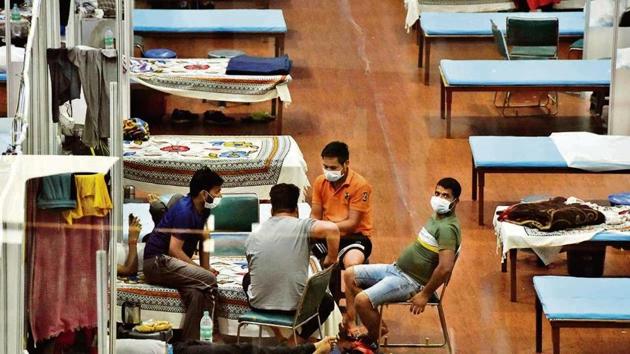Centre frames rules for Covid care centres in gated colonies
The facilities created in these colonies can be utilised to quarantine suspected cases or isolate those who are asymptomatic, pre-symptomatic, or mildly symptomatic.
The Union ministry for health and family welfare on Friday released guidelines for gated colonies across the country to create facilities for the patients of coronavirus disease as the number of total cases in India touched 1,076,479 with 26,812 succumbing to the viral infection.

Facilities created by the colony managements would be “more acceptable to the residents and help reduce the burden on existing facilities”.
The facilities created in these colonies can be utilised to quarantine suspected cases or isolate those who are asymptomatic, pre-symptomatic, or mildly symptomatic. The facilities are not meant for people over the age of 65 and the children below the age of 10, the guidelines stated.
Also read: India added last quarter million Covid-19 cases in just 8 days, 3 states added 55.7% patients
Pregnant or lactating mothers, persons with comorbidities such as diabetes, hypertension, heart disease, kidney disease, chronic respiratory disease, cancer or other illnesses and those who use drugs that compromise the immune system will also not be allowed to stay at these centres, the guidelines added.
India is now the third country in the world to have more than a million confirmed Covid-19 cases. India has conducted about 13.1 million tests, behind only the United States and Russia.
Neighbourhood Covid Care Centres were to be operationalised with minimal support from the government in case the number of cases soared and the requirement for beds went up. Besides the creation of Covid care centres in the colonies, the government has also been holding training programmes under the ‘Swasthya Doot’ project to prepare community volunteers in basic health care techniques.
Also read: COVID-19 Statistics for India
The ministry guidelines stated that community centre or common utility areas can be used for setting up these centres. Vacant flats that are isolated from occupied ones may also be used. The centre must have a separate entrance and exit gate, follow hand hygiene and thermally scan all persons who enter.
Within the centres, the beds have to be placed at a distance of 3 feet and adequate natural ventilation has to be ensured. The air conditioning system should follow the government guidelines of maintaining the temperature between 24°C to 30°C and relative humidity between 40% and 70%, avoid re-circulation of air, and ensure as much intake of fresh air as possible.
These centres will be linked to surveillance teams and an ambulance service. They will be staffed by doctors from either within the community or those provided by NGOs. They have to undergo training on a government portal. Support for clinical assessment, sample collection, and transportation will be provided, the guidelines stated.
The guidelines also stated that continuous monitoring of the centre (by guards or via video feed) is needed to ensure that patients do not go out.
To engage the community in the prevention of the infection, Residents’ Welfare Associations (RWAs) should encourage people above the age of 65, pregnant women, and children to stay at home and keep contact with visitors to a minimum, the ministry stated in another document.
The guidelines also called for creating awareness on preventive measures, need for early reporting on the disease and fight the stigma
If a colony is declared a containment area then the Resident Welfare Associations (RWAs) must facilitate house-to-house screening, ensure daily surveillance, shift suspected cases to the nearest Covid-19 facility, and identify volunteers to ensure the supply of essential services, the guidelines stated.
“The involvement of the community is essential when it comes to preventing and managing this infection. The government should have taken steps to involve people from the start. In places such as Delhi and Mumbai, the number of cases has started stabilising—involving the community in setting up Covid care centres in these places would have been helpful. This can be implemented in maybe Bengaluru, Chennai and their outskirts, and some places in Telangana where the number of cases is still quite high or is rising. Other than that, most cities and towns are not too well-planned and have very few gated colonies that can implement this,” said Dr Jugal Kishore, the head of the department of community medicine at Safdarjung Hospital.




